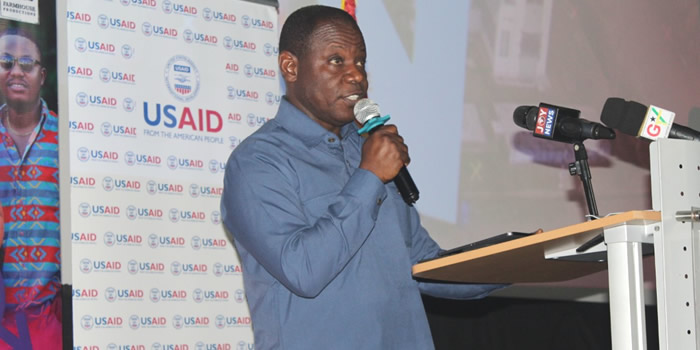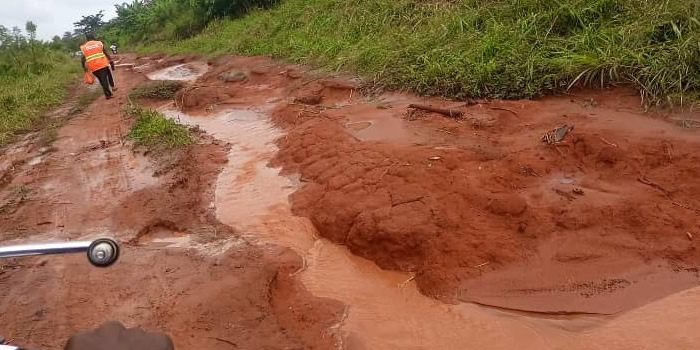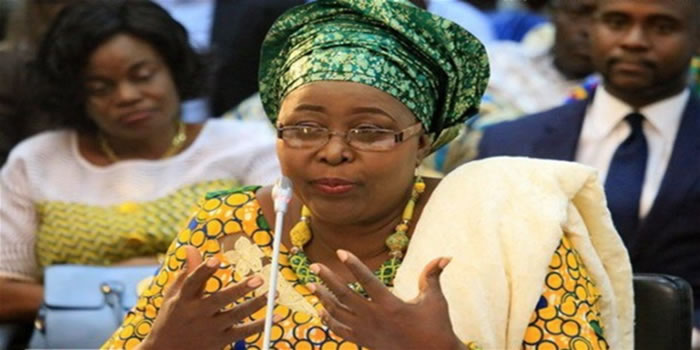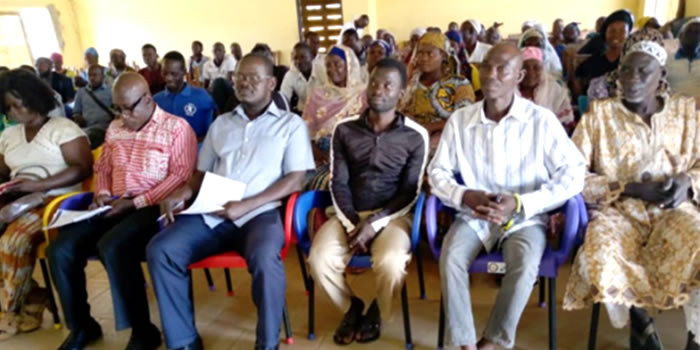

Summary of Key Community Development Needs and Aspirations
Local Government (Urban, Zonal and Town Councils and Unit Committees (Establishment) Instrument 1994, L.1 1589, establish the Town and Area Councils and mandate them to replace the Town and Village Committees which hitherto had the responsibility of community / village development. Specifically, sub-section 1 of the second schedule of the L.1 1589 state inter aria, among the functions of Urban, Zonal and Town Councils.
To take over as appropriate, all the functions formerly performed by the Town and Villages Committee concerned. Sub section 9 (vii) of the same second schedule also state among others state 7o prepare short medium and long-term development plans for the Urban area or Town for approval of the Assembly. Consequent to these the Sub District Structure in A.A.K District had drawn their development priorities covering the needs and aspirations of the various communities in their areas of jurisdiction.
The summary community needs and aspirations are as follows:
Abakrampa Area Council
Provide credit schemes within the Area Council
Rehabilitation and construction of markets
Improvement of educational infrastructure.
Intensive education on teenage pregnancy as well as school dropout.
Provision of health Post.
Employment creation.
Conflict resolution programmes
Provision of a community centre.
Construction of feeder roads
Ayeldu Area Council
Public education on the need to protect the environment (esp. forest resources).
Rehabilitation of roads
Organize workshops and training for the Traditional Council on roles, responsibility and functions.
Establishment of market for Agric Produce.
Employment creation for the youth.
Renovation of Educational infrastructures
Provision of credit facilities.
Effective / efficient planning of streets.
Construction of toilet facilities.
Amosima Area Council
Rehabilitation of roads and construction of culverts.
Establishment of Health centre
Establishment of cooperatives
Establishment of Market.
Formation of Credit Unions.
Construction of more drains
Construction of Community Centre.
Promotion of Youth and sports activities.
Rehabilitate feeder roads.
Improving educational infrastructure
Obohen Town Council
Rehabilitation of schools
Employment creation for the Youth.
Provision of potable water
Introduction of schemes to attract the youth into agriculture.
Construction of irrigation schemes.
Establishment of organized market
Establishment of Cooperative societies.
Rehabilitation of all feeder roads.
More Town Council
Rehabilitation of basic school infrastructure.
Development of new sites for waste disposal.
Establishment of agro-based industries.
Provision of housing for Teachers.
Improve road network.
Establishment of Co-operative and Credit Unions.
Abura Dunkwa Town Council
Supply of school furniture
Creation of employment avenues and credits assistance for the people
Establishment of agro-based industries.
Improve transportation network.
Development of new sites for waste disposals
Asebu Area Council
Establishment of Agro-based industries.
Provision of credit facilities on non-interest basis.
Construction of an organized market at Asebu.
Establishment of primary schools
Construction of gutters in three (3) communities.
Rehabilitation of school buildings
Extension of electricity to all parts of Districts.
Drawing of Abura Dunkwa township layout
Creation of Employment Avenue especially for youth
Provision of communication facilities.
Nyamfeku Ekroful Area Council
Rehabilitation and construction of markets
Construction of feeder roads
Provision of health Post
Establishment of Agro-based industries.
Provision of credit facilities on non-interest basis
In making such demands the communities have reciprocated by committing themselves to provide counterpart support in the form of communal labour, water, sand and stones for the implementation of their needs. Demands And Aspirations Of The Decentralized Departments, Are Summarized Below:
Provide residential accommodation for staff
Landscaping of office environment to check effects of erosion
Supply of high technology equipment and logistics to District Departments e.g. computers, telephones, photocopiers, etc.
Supply of furniture to offices
Supply of field vehicles to departments
Organize training programmes for staff of departments
Support departmental programmes with funds and logistics
DA to set up a Public Relations Unit to project the image of the District
Institution of incentive package for workers
The decentralized departments have suggested that sources of funding for the aforementioned programmes and projects should include: Development Partners, NGOs, the World Bank, the Private Sector, the District Assembly, and Government of Ghana etc.
The decentralized departments are ready and committed to help the District Assembly to execute the following programmes and projects:
Planning and carrying out a credible revenue generation campaign
Marketing the district’s economic and investment potentials
Projecting the image of the District
Disseminating information on the district’s policies, bylaws, projects and programmes
Implementing District Assembly programmes and sector activities
Monitoring and Evaluation of District Assembly programmes and sector activities
Summary of Key Demands of the Private Sector
Land and land acquisition Available and reliable supply of water and electricity.
Effective health delivery system.
Means and reliable source of credit facilities at affordable interest rates.
Simple and affordable tax regime
Availability of requisite manpower.
Existence of reliable communication facilities
Good and reliable road network.
Good market facilities and linkages
Peace security and harmony
Non-political interference on labour
Good and reliable sources of raw materials.
Enabling environment for effective collaboration of government and non-governmental agencies.
District assembly /government support for the private sector.
initiative Taken to Meet the Demands of the Private Sector:
The demands of the private sector usually relate to:
Access to affordable credit facilities.
Land acquisition
Improved managerial capacity.
Effective legal system or framework that support and promote work for business.
These are the initiatives taken by the Abura Asebu Kwamankese District Assembly and central government to address the needs of the private sector as an engine of growth.
Establishment of Poverty Alleviation Fund to give affordable loans to the private sector (business entities)
Organizing capacity building course for identified private institutions and individuals to strengthen their managerial skills, and make them attractive to NGO and Partner Organization support.
Re-organizing private institutions or establishments into viable cooperative societies
Creating market linkages by supporting and sponsoring the private sector in participating in District, Regional and National tours.
Linking the private sector to Donor or Partner Organization support, Non-Governmental Organizations (NGO’s) and Community Base Organization in the District Development Planning in areas of Environmental Management.
Development Goals and Objectives
Development focus
The development focus of the Abura Asebu Kwamankese District Assembly is to ensure that all the inhabitants in the district have;
Access to basics social services such as health care, quality education, portable drinking water and decent housing
Security from crime and violence
Ability to participate in decision that affect their lives
Adequate incentives to increase production
Improved urban and feeder roads accessibility
Goal Formulation under Growth and Poverty Reduction
Strategy Two - GPRS -II Themes
Goal formulation and development themes are the second important stage in the development planning process after the problem identification.Goals are therefore generalized statement of desires and aspirations in broad terms. Goals formulation serves as a link between the problem identification and development potentials, opportunities, constraints and challenges. The Ghana Poverty Reduction Strategy- GPRS -II has three main development themes as follows:
1 Private Sector led Competitiveness
2 Human Resource Development
3 Good Governance and Civic Responsibilities
The District development goals were therefore formulated under the Ghana Poverty Reduction Strategy themes.
Private Sector Competitiveness
To promote the establishment of small, medium and large industries.
To ensure an increase in the Internally Generated Revenue- IGR
To ensure maximum compliance to the rules and guidelines for the disbursement
To enhance tourism development
To promote access to credit facilities
To enhance increase in Agricultural production
To improve the living standard of the people
To improve income levels
To improve urban and feeder roads
To improve storage facilities
To ensure easy acquisition of land for development
To develop small -scale irrigation
Human Resources Development
To improve access to potable drinking water
To improve environmental sanitation
To improve the conditions of drains
To improve the quality if education
To improve the health needs of the people
To create public awareness on HIV/AIDS and prevention methods
To provide vocational skills and entrepreneurial training to unemployed youth and under employed in the district
To provide public education on reproduction health and family planning methods.
To promote community based rehabilitation and education of the physically to promote community based elderly programmes and advocacy against child labour abused.
To minimize conventions and traditions that impedes development.
Good Governance and Civic Responsibilities
To provide office and residential accommodation
To strengthen community’s participation in development decision making.
To enhance institutional development and capacity building
To ensure sound environmental management
Goal Compatibility Analysis
In development planning and goal formulation there is likelihood of conflicts in the goal formulation process. In view of that a Goal Compatibility Matrix - GCM was developed to identify conflicting goals and how to resolve them. Again, the analysis of the goal compatibility matrix in (appendix 1) has resulted in order of priorities in the Growth and Poverty Reduction Strategy -11- GPRS thematic areas as follows;
1st Priority - Private Sector led Competitiveness
2nd" - Human Resource Development
3rd" - Good Governance and Civic Responsibilities
Similarly, the analysis of the Goal Compatibility Matrix (appendix 1) has revealed the following conflicting goals;
Tourism development and HIV/AIDS
Tourism development and cultures and traditions
Small and medium scale industry (wood related and environmental management)
Environmental Management and Private Sector led Competitiveness (wood related activities)
The planning implication is that policies and programmes have to be formulated and implemented to minimize the conflicting effects.
Medium Term Technical Goals
Private Sector Led Competitiveness
To improve the standard of living of people
To ensure an increase in the internally generally revenue
To increase Agriculture Production
To promote access to credit facilities
To improve urban and feeder roads.
To develop small-scale irrigation.
To improve electricity coverage and P&T services
Human Resource Development
To improve access to potable drinking water
To improve environmental Sanitation
To improve the quality of education
To improve the health needs of the people
To create public awareness on HIV/AIDS and prevention methods.
To provide vocational skill and entrepreneurial training to unemployed youth and under employment
To promote community based rehabilitation and education of the physically and mentally challenged persons.
Development Projections
Development planning is meant to improve the quality of life of the people within the district, regional or national level. Therefore demographic data on the size and territorial distribution, composition and the changes that may occur in the future population forms one of the most essential tools necessary for development planning and programming. Planning which provides the framework for making decisions uses planning standards as its main analytical tool. As a result, the key essential services in the district were analysed using planning standards.
Development Priorities
District Prioritized Objectives
Based on the goals set for the various thematic areas for the district, the following objectives have been set for the overall achievement of the set goals.
Private Sector-Led Competitiveness
Objectives
To improve the surface accessibility of 50% of roads in the district by 2009
To improve upon market facilities in five communities in the district by 2009
To train 500 farmers in improved farming methods and practices by 2009
To increase storage potential to 70% by 2009
To train 250 practicing and potential entrepreneurs in small business management skills by 2009
To provide micro credit for 900 farmers under the youth employment programme by 2009
To generate 1,835 jobs under the youth employment programme by 2009
To support 230 practicing and potential entrepreneurs through the by 2009
To support 200 entrepreneurs to source grant from the African Development Fund (ADF) by 2009
To support 20 practicing entrepreneurs to attend local and international trade fairs by 2009
Human Resource Development
A Education
To improve upon the physical state of 5 educational institutions by 2009
To reduce the number of untrained teachers in the district by 20% by 2009
To improve upon the physical state of 10 basic schools by 2009
To provide logistics for 10 circuit school supervisors by 2009
To increase teachers accommodation in five Area Councils in the district by 2009
To increase classroom blocks by 10% by 2009
B Health
To achieve 50% success rate of the malaria roll back programme by 2009
To reduce HIV/AIDS incidence rate to 2.9% by 2009
To provide a district hospital by 2009
To equip three health centres in the district with modern facilities by 2009
To reduce the incidence rate of cholera and typhoid by 70% by 2009
To increase the number of paramedical staff by 5% by 2009
C Population Management
To reduce the population growth rate from 3.14% to 3.0% by the year 2009
To embark on bi-annual educational campaign on family planning methods by 2009
D Safe Water and Environmental Sanitation
To increase access to household VIP and institutional KVIP latrines to 90% by 2009
To increase access to potable water supply to 95% by 2009
To reduce environmental degradation by 40% 2009
To increase waste disposal sites by 50% by 2009
To provide two final waste disposal sites in the district by 2009
E Urban Development
To improve upon convenience and aesthetics in the built up environment by 2009
F Mainstreaming the Vulnerable and Excluded
To integrate and average of five (5) physically challenged into the informal apprenticeship training every year.
To increase awareness level of teenage pregnancy and other social vices by 30% by 2009
Good Governance and Civic Responsibility
Objectives:
To staff 50% of Area Council offices in the district by 2009
To provide furniture/logistics in all Area Councils by 2009
To improve on revenue generation by 3% by 2009
To rehabilitate three staff bungalows by 2009
To increase staff accommodation by 3. by 2009
To rehabilitate 10 staff quarters by 2009
To furnished the DPCU by 2009
To establish a data bank for the DPCU by 2009
To improve upon offices of deprived decentralized departments by 2009
Linking The District Objectives To The MDGs
Since the world is gradually becoming a global village, there is the need to determine whether district objectives formulated are in line with the MDGs. The table below indicates the link between the district objectives and the MDGs.
Monitoring and Evaluation
The District Assembly through the District Planning and Coordinating Unit-DPCU and Sectoral Departments as indicated in the annual action plan will do the monitoring and evaluation.Unforeseen changes in the Socio-economic and government policies will affect the plan. As a result there is the need for continuous monitoring and evaluation to enable necessary adjustment and revision.
Monitoring Report
Monitoring starts with the implementation of the project. It is aimed at making sure that the project. It is aimed at making sure that the project progress according to laid procedures, bill of quantities, and schedule as well as maintaining high quality standards. The District Monitoring Team will be responsible for the supervision of the programme and projects in the annual plan. A monitoring record will be kept during the implementation, which will form the basis of writing monthly monitoring report to the District Chief Executive and also to correct mistakes.
Monitoring Framework
The Monitoring Framework outlines the mechanism and indicators for the monitoring of the development programmes and projects and this is shown in table in pdf file below.
Post Implementation Monitoring
The District Assembly through its District Planning and Coordinating Unit (DPCU) and Sectoral Departments will undertake post implementation monitoring to enhance maintenance and sustainability if the development programmes and projects In this culture of maintenance the District Assembly and Sectoral Departments will allocate funds specially for maintenance the project durability.
Evaluation Report
Evaluation will be done using the objectively verifiable indicators and the means of verification in the logical framework. On-going evaluation technique will be at specific time intervals to assess the performance of the implementation of the development plan, programmes and projects.
Date Created : 11/13/2017 4:11:23 AM











 facebook
facebook
 X
X
 Youtube
Youtube
 instagram
instagram
 +233 593 831 280
+233 593 831 280 0800 430 430
0800 430 430 GPS: GE-231-4383
GPS: GE-231-4383 info@ghanadistricts.com
info@ghanadistricts.com Box GP1044, Accra, Ghana
Box GP1044, Accra, Ghana